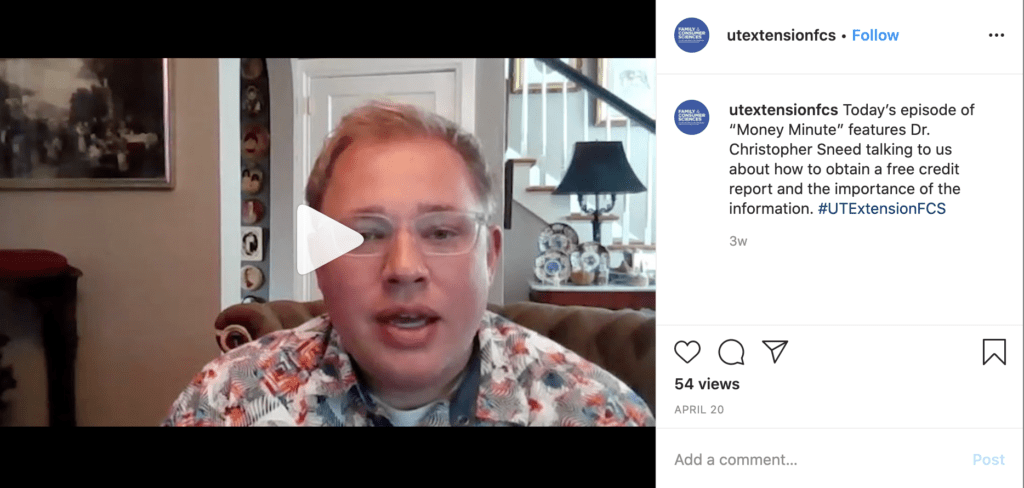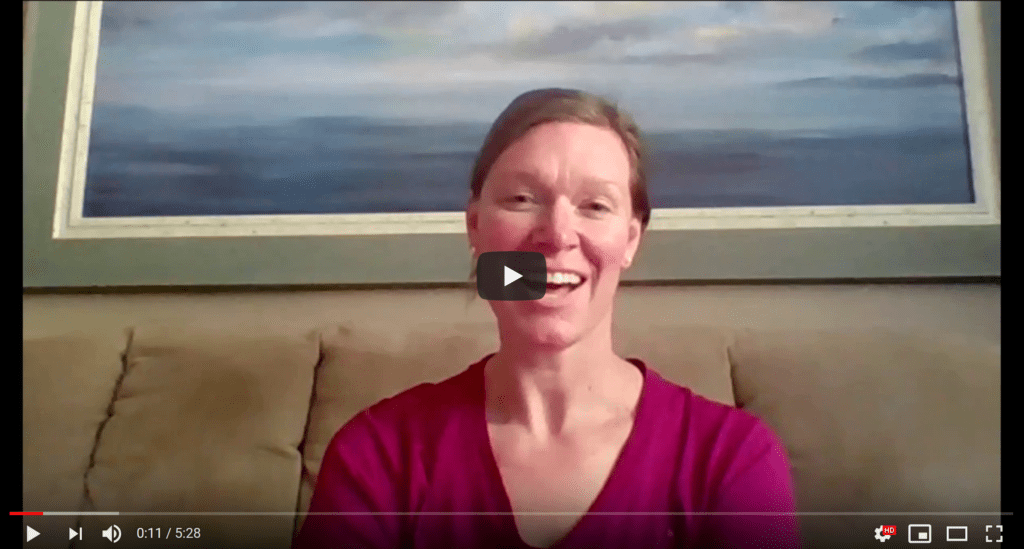Here are stories faculty and staff with the University of Tennessee Institute of Agriculture have provided about how they transformed their work during the novel coronavirus pandemic. The list that follows consists of online submissions through April 24. Watch for a list of entries submitted from April 25 through the end of May in the June issue of Common Ground.
We are asking UTIA members to share information about how they have transformed their work and responsibilities during the pandemic. These stories are important because they help to capture the ways we have found to deliver our mission of teaching, research, and outreach during a historic time.
Mark Campbell, assistant director, East Tennessee AgResearch and Education Center
I needed to point out areas that were included in a mowing contract to a vendor at multiple locations of our Center. In an effort to practice social distancing, we stayed in separate vehicles and used our phones to communicate.
Jeff Via, Extension agent, UT Extension Fayette County
I worked with another Extension agent, Becky Muller. As we practiced social distancing, we created a fact sheet, updated a blog, and both did our spin on two different YouTube videos all to educate producers on knotroot foxtail suppression.
Shelly Barnes, Extension agent, UT-TSU Extension Wilson County
The TAFCE Masks of Love project began as a response to community-level needs in Tennessee to provide homemade sewn masks to Tennessee health care workers and those on the front lines of the COVID-19 pandemic. Extension agents April Martin (DeKalb County) and Shelly Barnes (Wilson County) began seeing social media posts about making sewn masks at home. Family and Community Education (FCE) members and health care leaders contacted both agents to see if this could be a community-wide effort. At some point, April and Shelly discussed with each other their experiences and felt the need make this a statewide FCE project. After talking with Wanda Briddelle, TAFCE president (Wilson County), the team worked with Lisa Washburn, UT Extension Family and Consumer Sciences community health specialist, to develop a statewide plan including best practices for working with health care facilities, as well as recommended patterns approved by hospitals in each county. The project was shared with all FCS and 4-H agents across Tennessee. We determined the best way to connect with local sewists would be to establish a Facebook group called TAFCE Masks of Love that would help link them with county agents and offer tips, tricks, and troubleshooting. To date, more than 700 individuals have joined the Facebook group. More are added each day. Agents offer daily sewing tips as well as information related to FCE and Extension.
Several thousand masks have been distributed to health care facilities all across Tennessee. What began as an Extension outreach in DeKalb and Wilson Counties has now grown to forty counties and more than 700 FCE members, 4-H members, and community volunteers.
This project mirrors efforts made by FCE members eighty years ago during World War II. FCE, then known as Home Demonstration Clubs, participated in a nationwide mattress-making project designed to provide decent bedding for low-income families. The health care workers are in many ways like soldiers at wartime and are on the front line to take care of our citizens. They have been very grateful to receive face masks from Extension volunteers.
Several stories about the TAFCE Masks of Love project have been featured in local newspapers. A few are listed below:
• DeKalb County: WJLE and The Smithville Review
• Wilson County: Lebanon Democrat and The Wilson Post
In a separate effort, Wilson County Extension launched a Pen Pal Project. Its focus is on sending letters, notes, and cards to our most vulnerable population of FCE members, Master Gardeners, and farmers. Eleven FCE members and 4-H members have volunteered to send weekly letters, notes, or cards to fifty-nine individuals. Agents working with the selected groups chose individuals or couples who may not have a strong support system in place and may miss being as interactive as they used to be before COVID-19. Our office sent handmade cards to all the individuals to kick off the program. Our goal is to keep these friends engaged and upbeat in what could be a sad and lonely time.
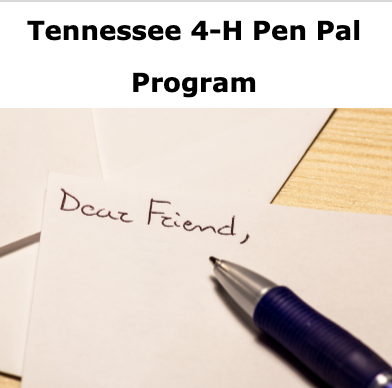
John Goddard, Extension agent, UT Extension Loudon County
I posted a video on Facebook on how to calibrate a boomless pesticide tractor sprayer. Spring is when pastures and hay fields need to be sprayed to control weeds. I’ve had a good number of calls and texts asking more questions and thanking me for posting the video.
Karen Tobias, professor, small animal surgery, UT College of Veterinary Medicine
In anticipation of the shortage in personal protective equipment (disposable masks and gowns, surgical gloves, and drapes), I performed a literature search to find appropriate substitutes based on scientific evidence. I compiled the information for an in-house publication at UTCVM, shared it on the ListServ for the Society of Veterinary Soft Tissue Surgeons, and submitted it to Clinician’s Brief. They turned it into an informative quiz and published it online within two days of receipt. They have been rotating it with their other online COVID-19 publications. The information provides veterinarians with options for PPE replacement when they need to do emergency surgeries or run short of disposable surgical gloves. The site is at cliniciansbrief.com. A password is needed to see the entire quiz, I believe. I am happy to share the original review paper if you would like us to have more online information for health care workers, as this applies to human and veterinary medicine, as well as research projects.
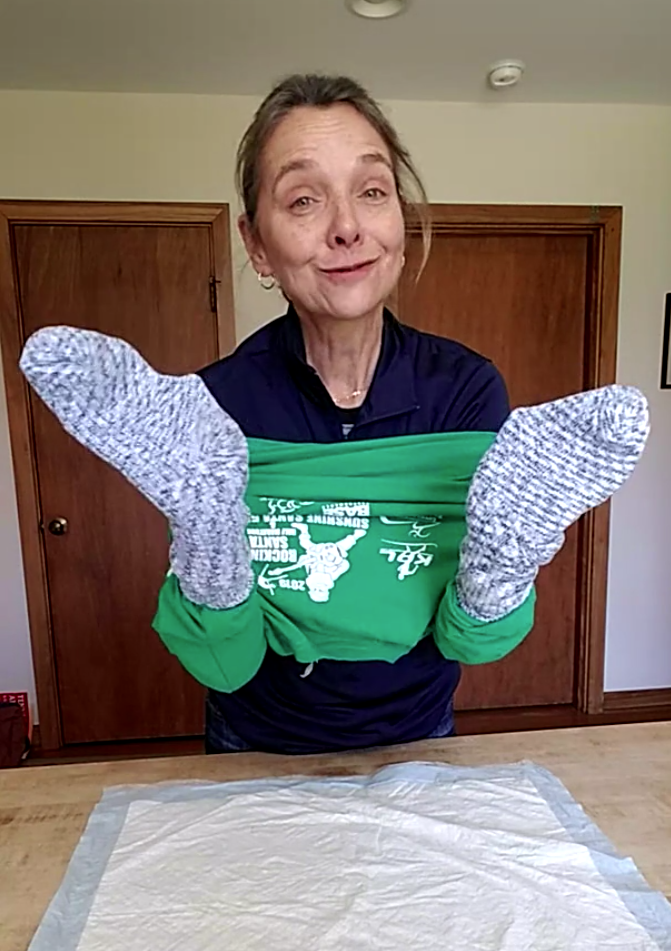
Also, our Veterinary Introduction to Surgery elective was disrupted by the pandemic, and I was unable to teach in-house labs. I developed online lessons the students could practice using supplies from home. I made videos on how to fold a surgery gown using a zip-up jacket and “puppy pad” in place of the gown and linen wrap, and I used a long-sleeved cuffed T-shirt and rubber gloves and hiking socks to teach “closed gloving,” a technique used in preparation for sterile surgery. I am happy to share the videos online. The ones in which the socks are acting as surgery gloves are quite entertaining!
Emily Barton, Extension agent, UT Extension Carter County
We developed a virtual contest for 4-H Achievement for fourth- through eighth-grade students. This is a team effort with Johnson County Extension at the lead, followed by 4-H staff in Sullivan, Carter, Washington, Unicoi, Greene, Hancock, and Hawkins Counties. We shared a post in email, social media, and other digital methods in all eight counties. We look forward to continuing this tradition in a new method and hope it will encourage new participation with the technology component.

Derrick Stowell, education and horticultural therapy program administrator, UT Gardens, Knoxville
We’ve made a number of changes. One is that we created horticultural therapy garden kits for assisted living and memory care facilities that we work with. Due to COVID-19, we are unable to visit the facilities and provide horticultural therapy sessions. We developed a garden activity kit as a way to help the residents keep gardening. Over the past two weeks we have delivered 102 kits to eight of our partner facilities. We also provided these kits at a reduced cost to facilities to accommodate the facilities’ reduced activity budgets. We created the idea when one facility told us how important gardening has been for their residents. This is a quote from Maddie Conrad, activity director at Avenir Senior Living: “We have been working in the garden on the nice days and it is really helping our residents de-stress and cope during this odd time.” The work by our team has been highlighted by the American Horticultural Therapy Association.
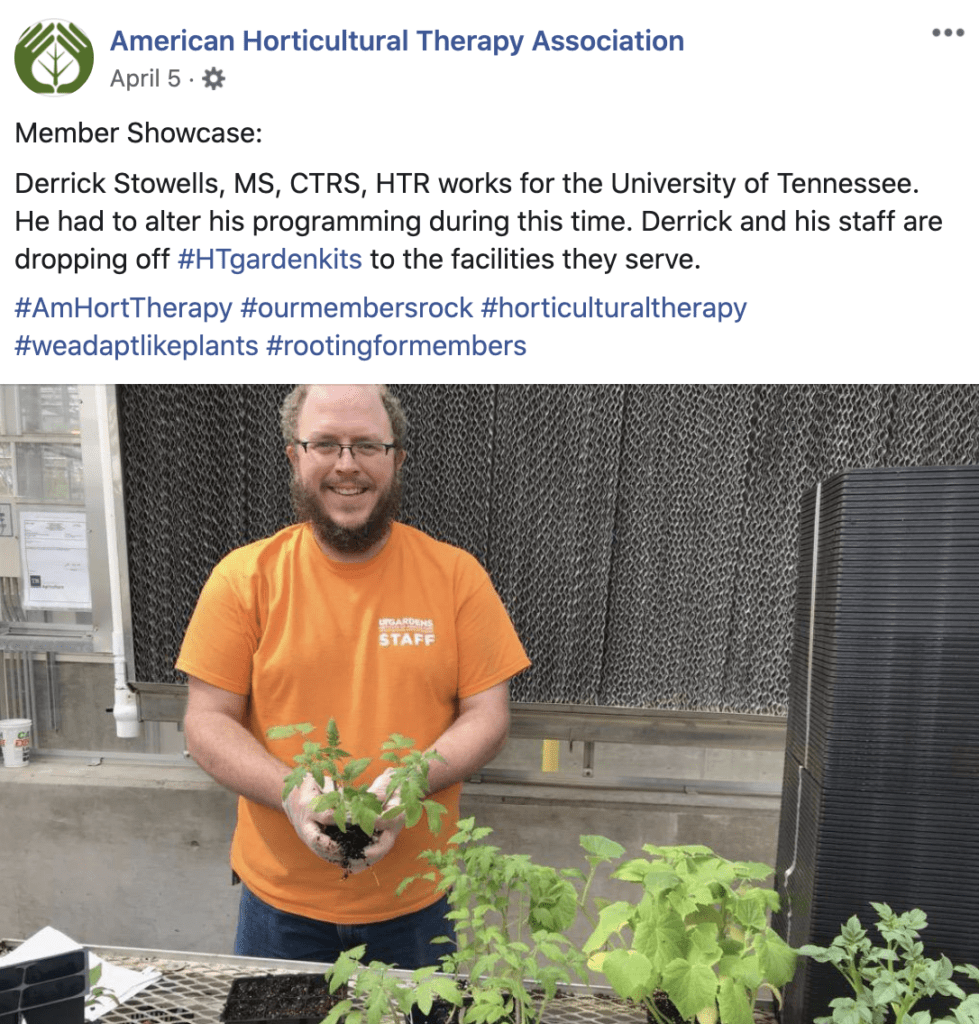
Through a contact with Keith Barber, I was connected to Terri Geiser, manager of UT Culinary Institute Community Cooking Classes. Like UT Gardens programs, the Culinary Institute hosts in-person classes for the community. Their program is also dependent on registration fees. Keith mentioned to Terri that UT Gardens had started moving programs online and I had several Zoom meetings to help Terri learn ways to move her cooking programs online. She was successful in hosting her first online class two weeks ago.
The UT Gardens Education Program developed several weekly social media posts and videos related to the Gardens and gardening for the public. One is the Friday Field Trip where we give a tour of one area of the garden each week. The other is a Tuesday craft activity that Whitney Welch, our educator, creates and shares on our social media accounts so we can keep engaging the public during this time.
Sarah Ransom, Extension agent and director, UT Extension Johnson County
To celebrate Extension month, the Johnson County Extension office did social media marketing with thirty-one Real. Life. Solutions. Using specific hashtags and logos we scheduled thirty-one posts to our Facebook and Instagram. We had 5,000-plus contacts and multiple shares. It was encouraging to see how, as COVID-19 stirred the community, more shares and engagement happened.
Anna Duncan, Extension agent, UT Extension Coffee County
In mid-March, I had a conversation with our Family and Consumer Sciences agent, Belinda Riddle, about the confusing information consumers were receiving from the news, the CDC, and the EPA about which household disinfectants would be most effective against the novel coronavirus. This conversation inspired the creation of a Coping with Covid website that served as an aggregate of relevant information that community members need to navigate the challenges they are facing as a result of the pandemic in every aspect of their lives. This website launched on March 20 and housed information about everything from facts about the virus to telecommuting, educational resources, stress relief, and financial resources. Belinda has made sure that I have all the latest information and publications from the UT Extension Family and Consumer Sciences department, and as new information has become available from that department and elsewhere, I have updated the site.
Matt Horsman, Extension agent and director, UT Extension Williamson County
Thanks to 4-H Culinary Project instructor Christy Beattie, we’ve presented a Culinary Series Challenge. Students take on a new culinary challenge each week and learn about specific aspects of that industry’s ingredient. The project has not only engaged students in culinary challenges, but also encouraged a greater depth of understanding of agriculture.
Nicole Marrero, Extension agent, UT Extension Overton County
UT Extension Overton County’s 4-H program has conducted three meetings as part of a “Global 4-H Friends” series. Each week we meet with someone from a different part of the world to introduce our youth to potential careers, as well as to new cultures. We have had up to twenty youth participate each week. Due to the success of the program, one 4-H member suggested we do a statewide 4-H pen pal program. We thought this was a great idea so that when life resumes to a new normal, members might see each other at a future event and have an instant connection. As of today, thirty 4-H members across the state have signed up.
Misty Bailey, curriculum and assessment coordinator, UT College of Veterinary Medicine
Veterinary students are expected to complete externships as part of their clinical education. For these, they go to external practices all over the country and world to get new and different experiences. Because of COVID-19, many of the externships were either canceled or students were prohibited from traveling to particular areas. We have had to develop ways for students to get different experiences without leaving their homes. The UT College of Veterinary Medicine, veterinary schools across the country and world, and veterinary continuing education providers have come together to share online resources and in many cases, offer them for free or at a reduced cost. I have been facilitating students’ switch to online content and assessment during this time. So far, we have had twenty-one students doing online continuing education in lieu of their externship experiences.
Jenny Biggs, program assistant, UT Extension Sumner County
We have been holding a Facebook Live series for our “Eat Smart and Move More” course via the Expanded Food and Nutrition Education Program (EFNEP) through the Sumner County UT Extension Office. We have about twenty people watching and commenting on our lessons. We ask them to comment on each lesson so that we can count this as their attendance. Once participants take part in at least eight of the ten lessons and complete exit forms, they will receive a certificate of completion, along with some of the items used throughout our lessons, such as measuring cups, measuring spoons, and a cooking thermometer.
Christina Swallows, Extension agent and director, UT Extension Overton County
Our office conducted two co-parenting trainings and is planning a third. We connected with our local hospital, a physician’s office, and the Emergency Medical Service (EMS) on the need for masks. We worked with Family and Consumer Educators (FCE) and county citizens to make masks that were given to people working on the front lines in the county. We redesigned the mask to include a pocket as requested for the EMS. The postal service and a home health from neighboring county called and asked for masks, too. These FCE members and volunteers made more than 800 masks and their time was valued at $6,045 for our county plus materials, according to Independent Sector.
Loren Stanford, Extension agent, UT Extension Henderson County
Following the closure of schools, I organized a weekly Activity in a Bag series called “Going on a BEAR Hunt.” This was distributed to the youth in Henderson County with the food dispersal program. Each activity was STEM related and something that all ages could do. My coworkers and Honor Club officers packed the bags each week. As of today, after five weeks, we have packed more than 9,000 bags.
Charles Martinez, assistant professor and Extension specialist, UT Department of Agricultural and Resource Economics
Faculty members Andrew Griffith (livestock economist), Aaron Smith (crop economist), and myself (farm and financial management economist) decided to make quick three- to five-minute videos that cover topics for our Tennessee producers. We decided to call the series Crops, Cattle and Charley. We knew that COVID-19 was introducing new issues that needed to be addressed, and we wanted to stay connected with our producers, thus our video series was born. Some of the topics covered are related to COVID-19 while others are more general and can be utilized regardless of a pandemic. We have released videos on Monday and Thursday each week for the past three weeks, and responses have indicated that the videos have been helpful and beneficial. The responses also led us to decide that we will continue this series beyond when “normalcy” returns.
Jacqueline Whittemore, associate professor, small animal internal medicine, UT College of Veterinary Medicine
Due to the massive impact of COVID-19 on veterinarian and veterinary resident training worldwide, I want veterinary professionals to be able to “stay home: scope later” and am offering free continuing education to veterinarians during the pandemic. I created “The Minimally-Invasive Scoping Course, an Immersive Guide for the Specialist” in 2010. Seeking to broaden the impact of the course, which provides advanced training in small animal internal medicine endoscopy, I developed an online-only version of it in 2019. The online version of the course normally costs $1,000, with fee reductions available for individuals living in developing and disadvantaged countries. Since inception, approximately 250 veterinarians from thirteen countries have participated in the courses. Now, I’m further increasing support of the veterinary community during the pandemic through the launch of a special QUARANTEAM edition. Enrollment is open until June 15, 2020, and is only available to veterinarians.
Luca Giori, assistant professor, Biomedical and Diagnostic Sciences, UT College of Veterinary Medicine
Claudia Kirk, associate dean for students at UTCVM, and I decided to offer, at first only to students, then to all the CVM faculty and staff family, some informal cooking classes using Zoom as the platform. Because I like to cook and I was born and raised in Italy, a country where food is a big component of our culture, I decided to share some of my family’s recipes in a “let’s cook together” type of event. A week before each event so all attendees can find the ingredients, I share the recipe and then we cook step-by-step the day of the event. So far, we prepared risotto with bell peppers and tiramisù. Future dishes could be orecchiette with anchovies, broccoli and black olives, and pizza.
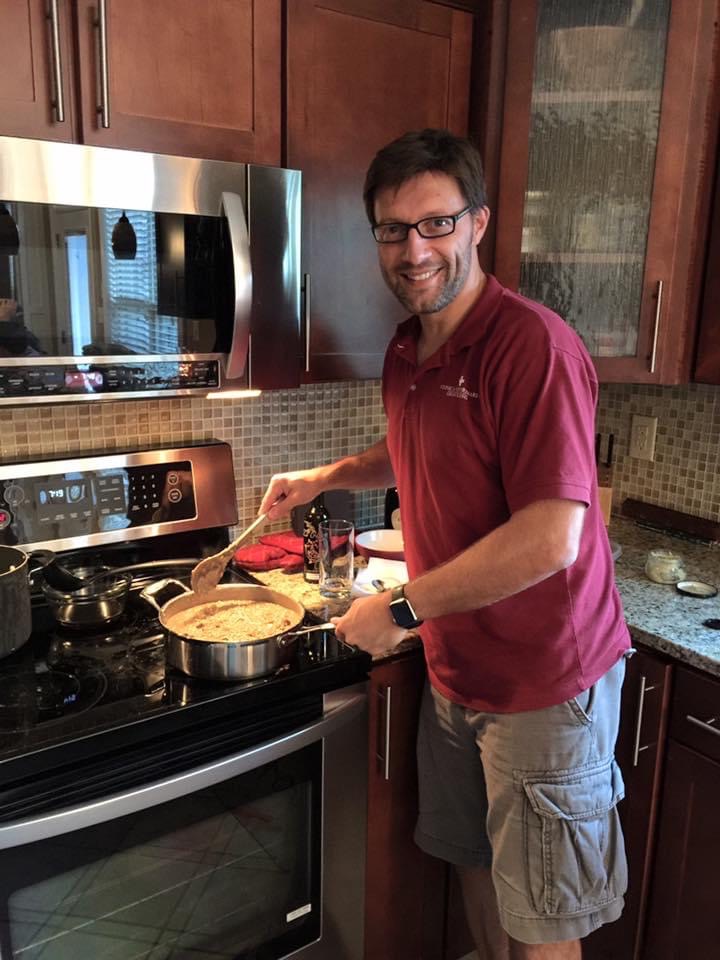
Justin Thomas, Extension agent and director, UT-TSU Extension Bradley County
In Bradley County, we have revitalized the national award-winning podcast, “Blue Ribbons and Boots,” which is a podcast by Extension agents for Extension agents and professionals. The team includes Meagen Brown and myself. Topics all focus on the “informal” professional development topics that happen in the car, on the phone, or by the coffee pot, and not the ones that are taught from a lectern.
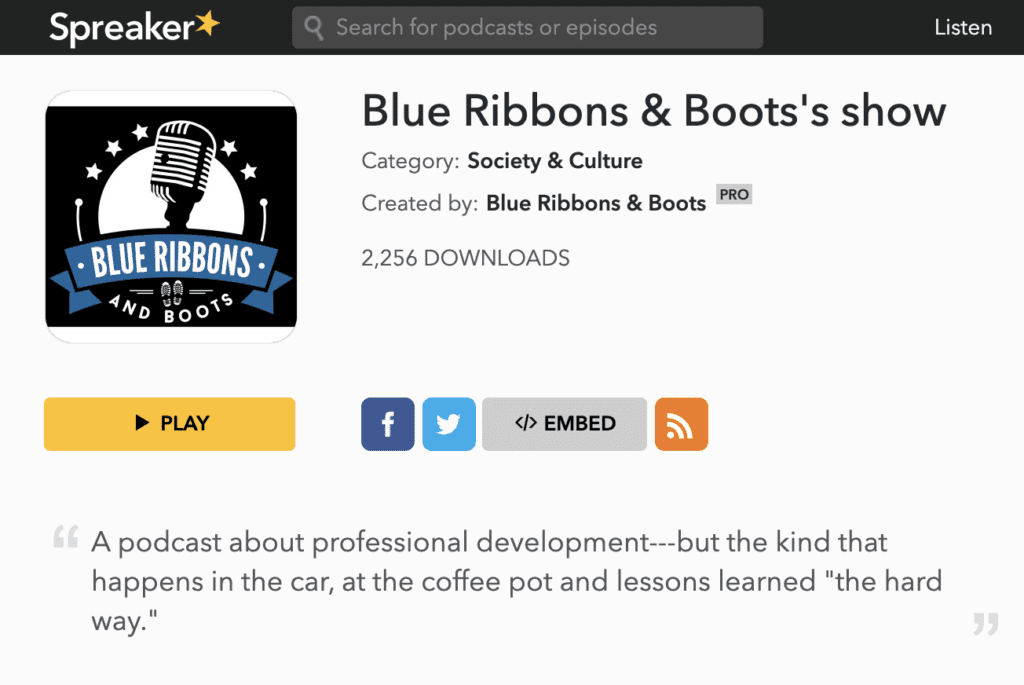
Mitchell Mote, Extension agent, UT Extension Rutherford County
The Tennessee Department of Agriculture approved a commercial pesticide applicator recertification Zoom training. I promoted the meeting to members of our ornamental horticulture service provider mail list via email. On April 13, eighty-eight individuals from Tennessee, Kentucky, and Alabama received two hours of Tennessee commercial pesticide applicator recertification credit by participating in the meeting that addressed correct and accurate pesticide use.
Christopher Sneed, assistant professor and consumer economics specialist, UT Extension Family and Consumer Sciences
The COVID-19 pandemic has created a money crunch for many families. Reduced work hours, furloughs, and unemployment threaten the financial livelihood of families, forcing them to reevaluate their normal habits of spending and saving. In addition, increased hours spent at-home have left some families searching for ways to fill their quarantine time. To help families facing financial challenges while capitalizing on more at home time, the Extension Consumer Economics Leadership Team developed a series of money management videos called “Money Minute.”
Each Money Minute video offers a small piece of research-based information, additional resources, and a call to action motivating individuals to adopt a specific money management practice. The videos cover credit, budgeting, insurance, children and money, emergency preparedness, frauds and scams, and legacy planning.
Leadership team members and video stars include Ann Berry, Marci Hethmon, Barb Metzger, Donna Calhoun, Shelly Barnes, Karen Jones, Tracy Hagan, and myself. Karen Sergent, Kelsie Crittendon, and Cris Miramontes from our department assisted with postproduction editing and graphics. The videos are being released weekly through the UT Extension Family and Consumer Sciences Facebook page, Twitter, Pinterest, and Instagram pages managed by Merritt Piper, Kelsie Crittendon, and our creative content team. A complete list of the videos released thus far can be found on the FCS YouTube account. At the time of this report, the Money Minute videos have seen a combined reach of 2,000 people on Facebook alone since the premiere of the first video, and we still have several more to launch. Additionally, the Money Minute videos have helped increase traffic across all FCS social media platforms.
Alice Kimbrell, volunteer coordinator and horticulturist, UT Gardens, Knoxville
At the UT Gardens, Knoxville, we strongly rely on volunteer support for our horticulture upkeep, event prep and execution, and educational programming. In an effort to keep our volunteers engaged, we have created a Facebook group specifically for UTG volunteers, have biweekly Zoom check-ins, and have started calling our volunteers to check in on them during this time.
Ann Berry, professor and consumer economics specialist, UT Extension Family and Consumer Sciences
UT Extension is one of only a handful of Tennessee Department of Education-approved providers of the personal finance training required for teachers to teach high school personal finance courses. Each year since 2007, a team of Extension Family and Consumer Sciences educators have been delivering two-day workshops across the state throughout the summer and fall to provide this fourteen hours of continuing education. Since face-to-face trainings are on hold, team leader Dr. Ann Berry requested permission from the Department of Education to provide the training through alternative delivery methods. The request was approved and Dr. Berry convened the Extension educators, Karen Sergent and Cris Emberton, in March to strategize alternative delivery methods for this program. Eight workshops are scheduled for 2020. The team discussed developing the program into modules for k@te, but decided that because this program is very hands on, the timeframe was too tight to develop a quality online program. The team decided that a pilot should be conducted by the teaching team of Mary Beth Lima, Heather Kyle-Harman, and Justin Thomas, the educators with the first scheduled workshop. They contacted the teachers who have registered for the workshop for input. In order to provide the required fourteen hours of education, the workshop will be delivered via two-hour Zoom sessions over seven days. To facilitate activity-based learning, the team will use the breakout room feature of Zoom. To maximize time, teachers will be given assignments before the first session as well as throughout the course of the workshop. Evaluations will include knowledge gained as well as perceptions of the delivery method. Teacher evaluations as well as the teaching team’s perceptions of success and any recommendations for revision will be shared with the other teaching teams.
The director for the National Endowment for Financial Education’s high school financial planning program and Extension faculty from two states have requested to join and observe the virtual workshop sessions.
The 2020 Personal Finance Teacher Training team members include myself, Priscilla Eddins, Sarah Poole, Autumn Vespie, Schancey Chapman, Patsy Watkins, Starla Hardin, Michelle Parrott, Christina Swallows, Tracey Hackett, Lacey Yeley, Rebecca Serrat, Elizabeth Renfro, Lamanda Westin, Rachel Dean, Nancy Rucker, Justin Thomas, Mary Beth Lima, and Heather Kyle-Harman.
Sarah Kite, Extension agent, UT Extension McMinn County
As I watch the world and community around me, I notice a lot of stress among many populations. In my family and consumer science work, I teach about stress and how to manage stress effectively. I see many who are reactive and not thinking clearly. Many social media rants reflect how people feel. So, in response to the community, I created “Relax Wednesday” videos. I pull information from “Building Strong Brains” and “Parenting Piece by Piece” curricula that I use on a daily basis to construct my videos. I began this work in April and have reached the general public through FB, and our local Athens City Schools have shared videos with their parents as well as the local DCS Relative Caregiver Support groups. We just launched and are about to publicize our UT Extension McMinn YouTube channel to reach even more people with our videos!
Watch for more success stories in the June issue of Common Ground.
